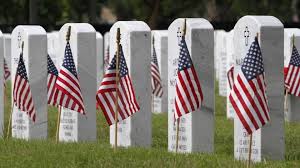Memorial
For Memorial Day, here’s something that, sadly, you’ve heard before.
And you have Daniel Butterfield to blame. He was just a kid from Utica, New York, who attended Union College and then joined his father’s firm, the Overland Mail Company. By the time he was 30, he was a principal executive at the firm, which had been renamed American Express. But on April 16, 1861, he gave it up and enlisted as a Sergeant in the Union Army. There his ridiculous rise continued: by September he was made a Colonel; by year’s end he was a Brigadier General.
In 1862, he led his men through the grueling Seven Days campaign, was wounded, and received the Medal of Honor. While he was recuperating in a military hospital, each night he listened to the buglers playing a tune that signaled the end of the day to the troops. This particular melody, borrowed from the French, was called a “Tattoo,” which comes from the Dutch words, “Tap toe,” an order to local bartenders to “turn off the tap.”
As Butterfield got well, he got sick of the Tattoo. It was too strident, too pushy. He wanted something different for his brigade. Something calming and reassuring, something that would make his men feel like they were safe for the night. So he sat down with his bugler, Oliver Norton, and together they reworked a similar tune, “Scott’s Tattoo,” that had been composed by General Winfield Scott. The result was a simple, haunting melody of a mere 24 notes.
The first time it was played, in July 1862, it proved to be the most beautiful call anyone had ever heard. Buglers throughout the Union Army immediately took it up. They played it at dusk in Pennsylvania; they played it as the sun went down over Appomattox. By war’s end it was the standard army call to signal the end of the day. Since that time, it has been played around the world, in a thousand lonely places. It has soothed every American soldier to sleep, and laid every American casualty to rest.
Sadly, you’ve heard it many times before. It’s a devastatingly simple little thing. Just 24 haunting notes, barely even a song. It’s a humble tattoo, a mere taptoe, to signal the end of a day, or the end of a life.
It’s Taps.
